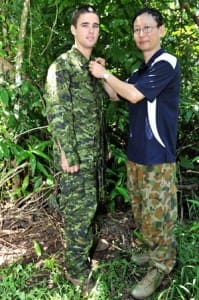
Private Taylor Gleeson has a Canadian uniform checked by Dr Bin Lee from the DSTO during the NATO camouflage effectiveness field trial at the Jungle Training Centre in Tully, Australia
In a DSTO press release, Chief of DSTO’s Human Protection and Performance Division Dr Simon Oldfield said, “The trial, and our membership of the NATO task group looking at camouflage, enables Australia to have access to knowledge, tools and methodologies that will inform future camouflage requirements.”
He went on to explain, “We will also be able to gather a more realistic threat assessment of hot and humid environments that will help us develop assessment methods for camouflage.”
Data on current issue and experiential patterns was collected using multispectral image recording and panoramic photography techniques to measure their effectiveness. Ten volunteers from the Australian Army’s 3rd Brigade wore the uniforms during the event.
As they did not disclose which patterns (other than CADPAT) they are assessing we are unsure how this may, if at all, affect the fielding of the Australian MultiCam Pattern developed by Crye Precision.


Very interesting, because it seems (from a digger’s point of view at least anyways) that the ADF has all but confirmed the adoption of a “locally developed variant” of MultiCam.
Seems like the Diggers do things slot more quickly than US forces. Maybe it’s the benefit of a smaller force or less beauracracy.
Either way, they seem to be doing it the right way.
Mate, this is a rare exception.
The Aussie forces have as many problems with Project over-runs as anyone else.
We have a Light Lifter requirement which the C-27J programme would fit more than adequately to replace our departed Caribou’s. Despite 25+ years of farting around and 3-4 attempts, we still don’t have them and are unlikely to for the next 4-5 years.
Infantry get a better representation in most things to do with uniforms and other such but only cos Commandoes and SASR “drive” that need from Afghanistan.
We’ve just has the 155mm SPG system cancelled.
They’ve bought lots of Bushmasters but not the new radios to fit them, so heaps are laagered until the radios are sorted out…………yeah its wonderful what a cluster even a small force can get itself into compliments of the second-class Governments we seem to get.
Regards,
I like where they said “The Australian Department of Defense said 18 current and experimental camouflage patterns were evaluated over two weeks in a variety of terrains to determine how effective the patterns were in the visual, ultraviolet, infrared and radar bands of the electromagnetic spectrum.”
They have finally added UV to the testing!
Good on them. Honestly, it’d be nice to be invisible to insects for once.
Yes, we have all wished to be invisible to insects. However, even if the biting insects didn’t locate us by vision (they still have blue and green cones in their retina), the primary means of hunting for some species is believed to be attraction to CO2 sources. If we stop breathing, we probably won’t attract mosquitoes and black flies — but we will attract vultures and blowflies.
It is my understanding that the Aussies are intelligent enough to reason that if they can use UV sensors in their UAVs to see the enemy, others can use UV sensors to see them. If you wish not to be immediately detected, it is good to stay up to date with sensor technology. JMO